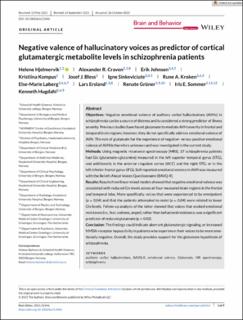| dc.description.abstract | Objectives
Negative emotional valence of auditory verbal hallucinations (AVHs) in schizophrenia can be a source of distress and is considered a strong predictor of illness severity. Previous studies have found glutamate to mediate AVH severity in frontal and temporal brain regions, however, they do not specifically address emotional valence of AVH. The role of glutamate for the experience of negative- versus positive emotional valence of AVH is therefore unknown and was investigated in the current study.
Methods
Using magnetic resonance spectroscopy (MRS), 37 schizophrenia patients had Glx (glutamate+glutamine) measured in the left superior temporal gyrus (STG), and additionally in the anterior cingulate cortex (ACC) and the right STG, or in the left inferior frontal gyrus (IFG). Self-reported emotional valence in AVH was measured with the Beliefs About Voices Questionnaire (BAVQ-R).
Results
Results from linear mixed models showed that negative emotional valence was associated with reduced Glx levels across all four measured brain regions in the frontal and temporal lobe. More specifically, voices that were experienced to be omnipotent (p = 0.04) and that the patients attempted to resist (p = 0.04) were related to lower Glx levels. Follow-up analysis of the latter showed that voices that evoked emotional resistance (i.e., fear, sadness, anger), rather than behavioral resistance, was a significant predictor of reduced glutamate (p = 0.02).
Conclusion
The findings could indicate aberrant glutamatergic signaling, or increased NMDA-receptor hypoactivity in patients who experience their voices to be more emotionally negative. Overall, the study provides support for the glutamate hypothesis of schizophrenia. | en_US |

